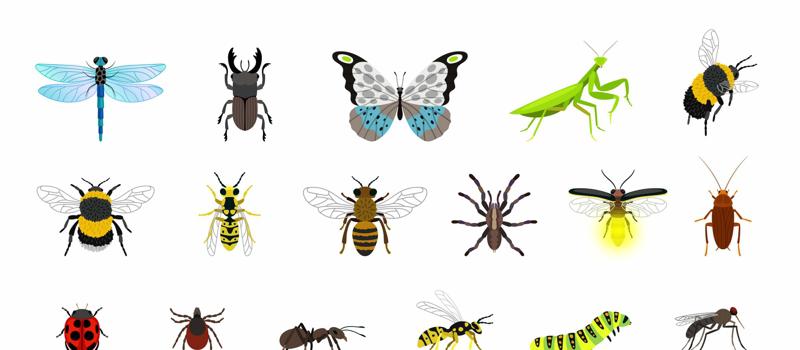Celebrating Diversity In Entomology
Posted by Mosquito Squad
February 3, 2023

February is Black History Month, a time to reflect upon and acknowledge the triumphs and challenges of black Americans past and present. This month, Mosquito Squad would like to pay tribute to the historic black men and women that helped create and enhance the field of entomology and pest management.
Dr. Charles H. Turner (1867-1923)
Possibly the first black entomologist in America, Dr. Charles Turner was one of the first insect scientists to examine how we think about thinking. In the early 20th century, the field of entomology was limited in its understanding of how the minds of insects function. Many scientists of the time believed that insects had no thought processes and were pre-programmed to carry out tasks such as foraging and mating. To challenge this notion, Dr. Turner conducted a series of experiments throughout his academic career demonstrating that insects could make decisions and learn. Such experiments included classically conditioning honeybees to associate colors with food rewards, teaching roaches to avoid dark areas of a room, and observing how moths react to different airborne sounds. The results of these studies demonstrated that insect behaviors could be influenced, and changes in behavior could be retained throughout trials.
Dr. Turner faced many obstacles during his career as access to laboratories, libraries, fair pay, and research assistance was limited or restricted for researchers of color. Nevertheless, during his career, Dr. Turner published over 41 papers detailing the abilities of insects to take in information, process, and adapt their behaviors. The results of his work with conditioning in invertebrates shook the field of entomology and solidified Dr. Turner as a pioneer of insect behavior and comparative psychology.
Dr. Margaret Strickland Collins (1922-1996)
As the first African American woman to earn her Ph.D. in entomology, Dr. Margaret Collins was a trailblazer for black excellence in insect science. Co-author of over 40 publications describing the biogeography, physiology, chemical defense strategies, and taxonomy of termites, Dr. Collins expanded termite research and urban entomology. Outside of the lab, Dr. Collins was a civil rights activist during the Tallahassee Bus Boycott, an organized effort by black students at the Florida Agricultural and Mechanical University (FAMU) to protest riding segregated buses. To assist protestors, Dr. Collins drove people to and from work as they continued to boycott public transportation. Her advocacy for social change met her science career as she gave symposium presentations and authored papers on "Science and the Question of Human Equality" and how racism, classism, and group-based prejudice effects relate to the cultural and biological evolution of people.
Dr. Collins is an icon for black female empowerment as she persevered through racial injustice and misogyny as a black woman in science at the height of the civil rights era. Her work in insect science and in her community expanded our understanding of insects and people.
Dr. Lonnie N. Standifer (1926-1996)
Receiving his Ph.D. in entomology from Cornell, Dr. Standifer's research focused on the effects of toxic chemicals on houseflies. This work primed him for his later research endeavors on honeybee physiology and nutrition while serving as the Director of the Carl Hayden Bee Research Center at Tucson. Understanding the crucial connection between honeybees and human health, Dr. Standifer's work with the Bee Research Center focused on understanding how chemical exposure affects honeybees, also known as honeybee toxicology. Issues of honeybee protection from pesticide application, why bees interact with flowering plants, and the composition of pollen were some of the topics Dr. Standifer addressed throughout his late career.
Upon retiring from his position in 1983, Dr. Lonnie Standifer broadened the field of pesticide use and honeybee health. Dr. Standifer's work brought forth much of the awareness and dedication to pollinator health that pest control companies and people share to this day.
Sophie Lutterlough (1910-2009)
Sophie Lutterlough found her roots in entomology outside the realm of academia. Lutterlough did not attend university; instead, she gained her knowledge and entomological expertise exclusively from her work with the National Museum of Natural History. Growing up in a pre-civil rights country, Lutterlough experienced first-hand the systemic racism black women faced in education and the workforce. Curatorial and scientific roles at NMNH were out of the question for people of color, so Lutterlough's career at NMNH began as an elevator operator, a position she held for 14 years. In her free time, Lutterlough would browse the exhibits throughout the museum, learning all that she could about the topics and biofacts on display. At this time in the museum's history, there was no information desk to answer questions on exhibits, so Lutterlough became a onewomen info center for staff and visitors alike.
In 1957, Lutterlough was given a chance to apply her curiosity and passion for learning as an insect preparator for the museum's curated insect collection. With little entomological experience, Lutterlough became a self-taught expert, eventually becoming a research assistant restoring Myriapod collections for the museum (the arthropod order for centipedes and millipedes). Lutterlough worked as an entomologist for the museum for 24 years, restoring insect and arthropod collections of tens to hundreds of thousands of specimens. Today, Sophie Lutterlough is remembered as a pivotal entomological curator and life-long learner.
